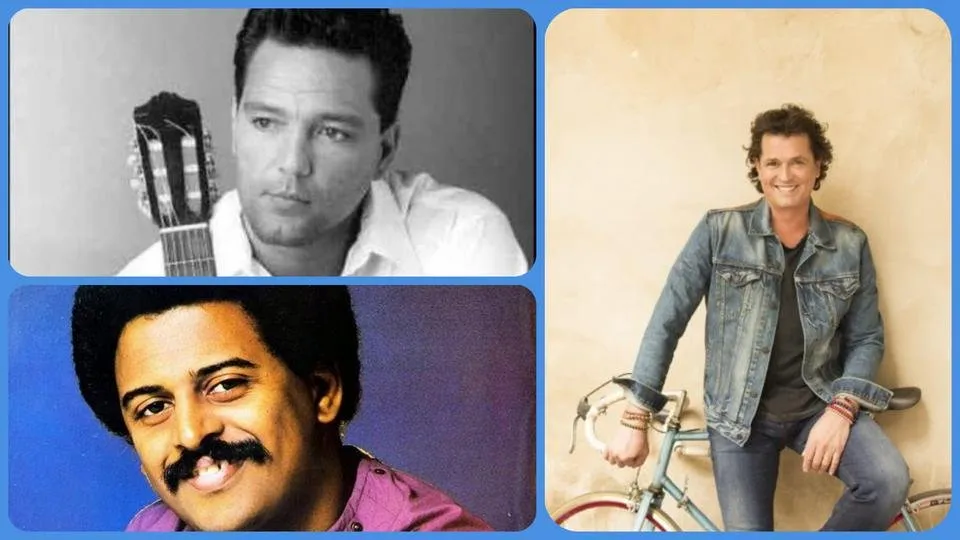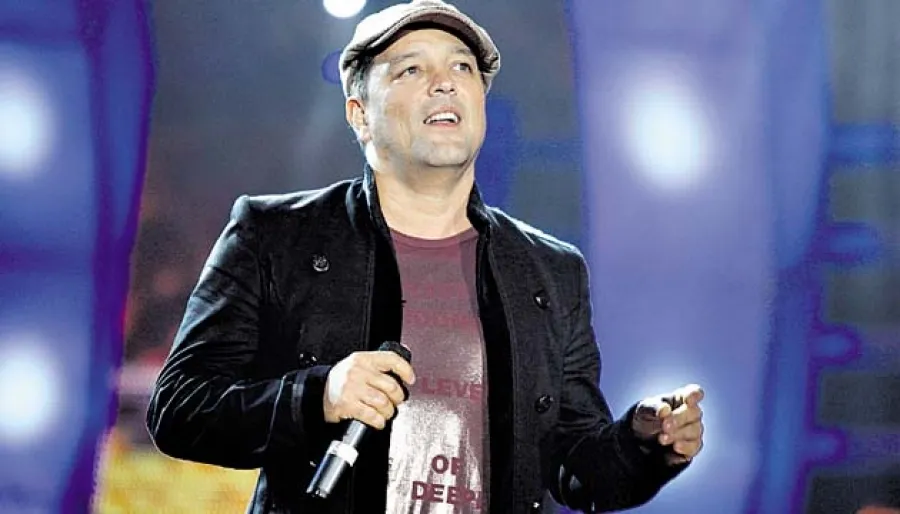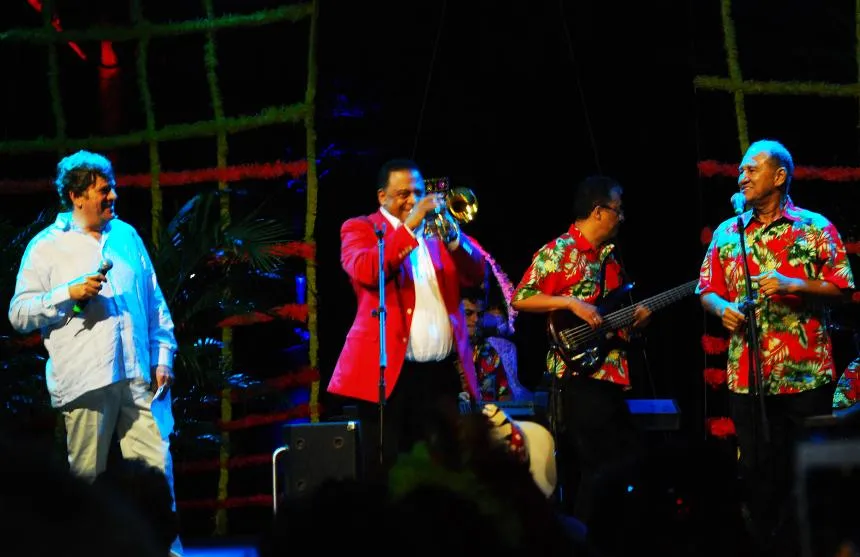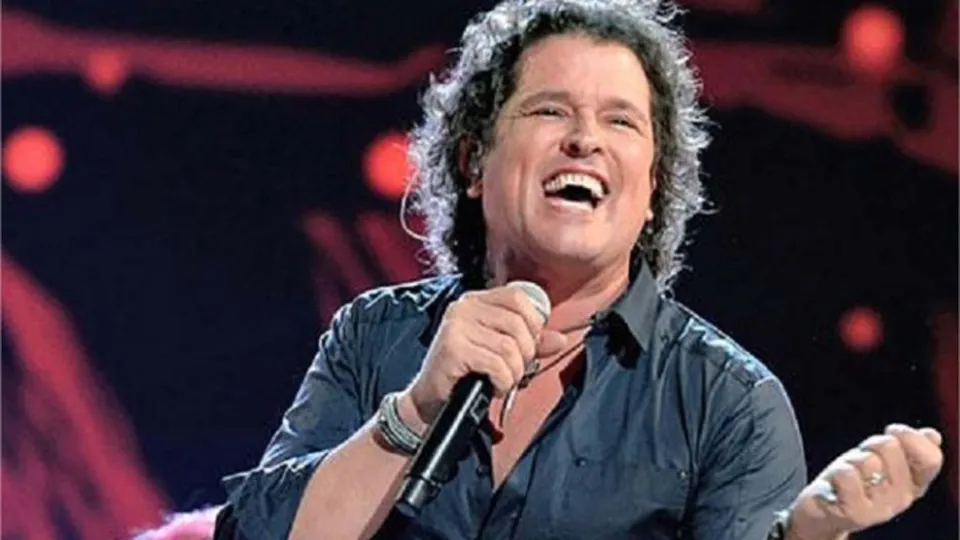Although the work has been conspiring so that I can not write for Steemit, today I take advantage and, even being a short post, I bring my review for #danceweekend. This is a space that I enjoy a lot, because it is always a challenge to remember a song, a group or a musical dance genre to tell something interesting.
Versión en español más abajo
Deutsche Version weiter unten

Sources - Fuentes - Quellen [Roberto Blades]] [Wilfrido Vargas] [Carlos Vives]
Today the review is about three songs, three different musical genres, although all Latin and representative of this portion of the earth. What the three themes have in common is that they had an impact on the public that kept them occupying the first places in the radial ranking in almost all of Latin America (and part of the world) for much more than a year and even after of almost 30 years are still live and continue to be danced. Precisely for these reasons I have called "3 classics" this publication, because they are songs that came here to stay.
Here is a brief review about each musical genre, the song and about the performer.
An African traveler
The well-known Colombian musician Calixto Ochoa recorded in 1983 a very picaresque lyrics song that made fun of the impact caused, among the women of that country, by anyone speaking a foreign language. Taking advantage of the fact that many African music records were arriving at that time, the composer Wilfrido Carmelo Martínez Mattos, known as "Manduquito", wrote this jocular song, where they imitate in an exaggerated way the sound of African languages.
The following year, the Dominican musician Wilfrido Vargas recorded this same song in a Dominican merengue rhythm, which became a social phenomenon immediately. The Dominican merengue, rhythm of which I spoke more extensively in my article Merengue in #danceweekend [English - Español - Deutsch], is the most important traditional rhythm of the Dominican Republic, with a very interesting history. This musical genre has had 3 important historical moments and one of them is due, among others to this musician, who achieved a level of modernization and fundamental development for the internationalization of this musical form. This recording corresponds to this process. "El Africano" (The African), song that was born in Colombia, to then travel to the Dominican Republic and from there to the rest of the world.

Some very rhythmic tears
Undoubtedly one of the most famous salsa performers in the world is the Panamanian Rubén Blades. But of that family, he has not been the only one with musical inclinations. The younger brother, Roberto Blades, also dedicated himself to composing and singing his songs. Although personally he did not come close to the brother's success, his song "Lágrimas" (Tears) sung by him as vocalist of the orchestra "La immensidad" surpassed all expectations and with that record they achieved sales that made them deserve Gold and Platinum Record.
This song was part of the record label Fania Record, with the distinctive sound of salsa born in New York, the confluence of the different Afro-Caribbean musical genres with the musical trends in the 60s and 70s in the United States. .
A song with a very modern and original arrangement for the year it was released, 1983.

A drop flows through the world
The vallenato is one of the musical genres of the Caribbean region of Colombia, which although it has its elements of African and indigenous origin, European influence predominates in it, which includes the presence of the accordion as the main instrument. This is a musical genre that has developed different variants and one of them is what is called Vallenato-pop, whose maximum representative is the singer Carlos Vives. In 1993 this also actor released his sixth album as a soloist, but this time dedicated to Colombian folklore, emphasizing this musical genre: vallenato.
His cover of a song by the composer Emiliano Zuleta, dating from 1938, included in that record, transcended all borders, giving Vives and Vallenato international fame: “La Gota Fría” (The cold drop).
Of the three songs mentioned here, without a doubt, this was the one that achieved the greatest worldwide projection, because in addition to the own version of Carlos Vives, it was also successful in countless other voices, including Julio Iglesias and the Ray Connif orchestra.
Music at the end of this post!

Roberto Blades - Source - Fuente - Quelle

Español
Aunque el trabajo ha estado confabulando para que yo no pueda escribir para Steemit, hoy le tomo ventaja y, aunque sea un post breve, traigo mi reseña para #danceweekend. Este es un espacio que yo disfruto mucho, porque siempre es un reto recordar alguna canción, grupo o género musical bailable para contar algo interesante.
Hoy la reseña es sobre tres canciones, tres géneros musicales diferentes, aunque todos latinos y representativos de esta porción de la tierra. Lo que tienen en común los tres temas, es que tuvieron un impacto en el público tal que los mantuvo ocupando los primeros lugares del ranking radial en casi toda América Latina (y parte del mundo) durante mucho más de un año y aún después de casi 30 años siguen vigentes y continúan siendo bailados. Precisamente por estas razones he llamado “3 clásicos” esta publicación, porque son canciones que llegaron para quedarse.
A continuación una breve reseña sobre cada género musical, la canción y sobre el intérprete.
Un africano viajero
El conocido músico colombiano Calixto Ochoa grabó en 1983 una canción de letra muy picaresca que se burlaba del impacto, que causaba entre las mujeres de ese país, cualquier persona que hablara alguna lengua extranjera. Aprovechando que para esa época estaban llegando muchos discos de música del continente africano, el compositor Wilfrido Carmelo Martínez Mattos, conocido como “Manduquito”, escribió esta jocosa canción, donde imitan de manera exagerada el sonido de idiomas africanos.
Al año siguiente, el músico dominicano Wilfrido Vargas grabó esta misma canción en ritmo de merengue dominicano, la cual se convirtió en un fenómeno social de manera inmediata. El merengue dominicano, ritmo del que hablé de manera más extensa en mi artículo Merengue in #danceweekend [English - Español – Deutsch], es el más importante ritmo tradicional de República Dominicana, con un historia muy interesante. Este género musical ha tenido 3 momentos históricos importantes y uno de ellos se debe, entre otros a este músico, quienes lograron un nivel de modernización y desarrollo fundamental para la internacionalización de esta forma musical. A este proceso corresponde esta grabación. “El Africano”, canción que nació en Colombia, para luego viajar a República Dominicana y de allí al resto del mundo.

Unas lágrimas muy rítmicas
Sin duda alguna uno de los intérpretes de salsa más famosos del mundo es el panameño Rubén Blades. Pero de esa familia, él no ha sido el único con inclinaciones musicales. El hermano menor, Roberto Blades, también se dedicó a componer y a cantar sus canciones. Aunque en lo personal no se le acercó al éxito del hermano, su canción “Lágrimas” cantada por él como vocalista de la orquesta “La inmensidad” supera todas las expectativas y con ese disco logran ventas que los hacen merecedores de Disco de oro y Platino.
Esta canción formó parte del catálogo del sello disquero Fania Record, con el sonido característico de la salsa nacida en Nueva York, la confluencia de los distintos géneros musicales afro-caribeños con las corrientes musicales de moda en los años 60 y 70 en los Estados Unidos.
Una canción con un arreglo muy moderno y original para el año en que se editó, 1983.

Una gota fluye por el mundo
El vallenato es uno de los géneros musicales de la región caribeña de Colombia, que aunque tiene sus elementos de origen africano e indígena, predomina en él la influencia europea, que incluye hasta la presencia del acordeón como instrumento principal. Este es un género musical que ha desarrollado distintas variantes y una de ellas es la que se denomina Vallenato-pop, cuyo máximo representante es el cantante Carlos Vives. En 1993 este también actor, lanzó su sexto disco como solista, pero esta vez dedicado al folklore colombiano , haciendo énfasis en este género musical: el vallenato.
Su versión de un tema del compositor Emiliano Zuleta, que data de 1938, incluido en ese disco, trascendió todas las fronteras, dándole a Vives y al Vallenato fama internacional.
De las tres canciones acá mencionadas, sin duda alguna, esta fue la que logró alcanzar mayor proyeción mundial, pues además de la propia versión de Carlos Vives, fue éxito también en innumerables otras voces, incluyendo la de Julio Iglesias y la orquesta de Ray Connif.
¡Música al final de esta publicación!

Wilfrido Vargas - Source - Fuente - Quelle

Deutsch
Obwohl die Arbeit konspiriert um mich für Steemit nicht schreiben zulassen, nehme ich heute Vorteil und, auch wenn es ein kurzer Post ist, bringe ich meine Rezension für #danceweekend mit. Dies ist ein Raum, den ich sehr genieße, weil es immer eine Herausforderung ist, sich an ein Lied, eine Gruppe oder ein musikalisches Tanzgenre zu erinnern, um etwas Interessantes zu erzählen.
Heute ist die Rezension über drei Lieder, drei verschiedene Musikrichtungen, obwohl alle lateinischen und repräsentativ für diesen Teil der Erde. Was die drei Songs verbindet ist, dass sie sich auf die Öffentlichkeit ausgewirkt haben, die sie in fast ganz Lateinamerika (und Teilen der Welt) für mehr als ein Jahr die ersten Plätze in der Radial-Rangliste besetzt hielten und sogar nach fast 30 Jahre noch lebendig sind und weiter getanzt werden. Gerade aus diesen Gründen habe ich "3 Klassiker" diesen Beitrag genannt, weil es sich um Lieder handelt, die gekommen sind, um zu bleiben.
Hier ist eine kurze Übersicht über jedes Musikgenre, das Lied und über den Performer.
Ein afrikanischer Reisender
Der bekannte kolumbianische Musiker Calixto Ochoa nahm 1983 ein sehr pikareskes Song auf, das sich lustig machte über die Auswirkungen die unter den Frauen dieses Landes, von jedem der eine Fremdsprache sprach, verursacht wurden. Der Komponist Wilfrido Carmelo Martínez Mattos, bekannt unter dem Namen "Manduquito", nutzte in seinem Lied die Tatsache, dass zu dieser Zeit viele afrikanische Musik-Platten eintrafen, und schrieb sein Lied in dem er den Klang afrikanischer Sprachen übertrieben nachahmt.
Im folgenden Jahr nahm der Dominikanische Musiker Wilfrido Vargas das gleiche Lied in dominikanischen Merengue-Rhythmus auf, der sofort zu einem sozialen Phänomen wurde. Der dominikanische Merengue, deren Rhythmus ich ausführlicher in meinem Artikel Merengue in #danceweekend [English - Español - Deutsch] erkläre, ist der wichtigste traditionelle Rhythmus der Dominikanischen Republik, mit einer sehr interessanten Geschichte. Dieses Musikgenre hat drei wichtige historische Momente gehabt und einer von ihnen ist unter anderem diesem Musiker zu verdanken, der der Modernisierung und grundlegenden Entwicklung für die Internationalisierung dieser musikalischen Form beigeholfen hat. Diese Aufnahme entspricht diesem Vorgang. "El Africano" (Der Afrikaner), Lied, das in Kolumbien geboren wurde, um dann in die Dominikanische Republik zu reisen und von dort zum Rest der Welt.

Einige sehr rhythmische Tränen
Zweifellos einer der berühmtesten Salsa-Künstler der Welt ist der der panamaische Sänger Rubén Blades. Aber von dieser Familie war er nicht der Einzige mit musikalischen Neigungen. Der jüngere Bruder, Roberto Blades, widmete sich ebenfalls dem Komponieren und Singen seiner Lieder. Obwohl er dem Erfolg des Bruders persönlich nicht nahe kam, übertraf sein Lied "Lágrimas" (Tränen), das er als Sänger des Orchesters "La immensidad" gesungen hatte, alle Erwartungen und mit diesem Album erzielten sie einen Umsatz, für den sie Gold und Platin Record würdig wurden.
Dieser Song war Teil des Katalogs des Plattenlabels Fania Record, mit dem unverwechselbaren Sound der Salsa geboren in New York, dem Zusammenfluss der verschiedenen afro-karibischen Musikgenres mit den musikalischen Trends der 60er und 70er Jahre in den USA.
Ein Lied mit einem sehr modernen und originellen Arrangement für die Zeit, in dem es veröffentlicht wurde, 1983.

Ein Tropfen fließt durch die Welt
Das vallenato gehört zu den Musikgenres der karibischen Region Kolumbiens. Obwohl es Elemente afrikanischer und indigener Herkunft aufweist, dominiert der europäische Einfluss, zu dem auch das Akkordeon als Hauptinstrument gehört. Dies ist ein musikalisches Genre, das verschiedene Varianten entwickelt hat und eines davon ist das, was Vallenato-Pop genannt wird, dessen größter Vertreter der Sänger Carlos Vives ist. Im Jahr 1993 veröffentlichte dieser auch Schauspieler sein sechstes Album als Solist, aber dieses Mal widmet er sich der kolumbianischen Folklore und betont dieses musikalische Genre: vallenato.
Sein Cover eines Liedes des Komponisten Emiliano Zuleta des Jahres 1938, das in dieser Platte enthalten ist, überschreitet alle Grenzen und gibt Vives und Vallenato internationalen Ruhm: "La Gota Fría" (der kalte Tropfen).
Von den drei hier genannten Songs war dies zweifelsohne die mit der größten weltweiten Projektion, denn neben der eigenen Version von Carlos Vives war sie auch in zahllosen anderen Stimmen erfolgreich, darunter Julio Iglesias und das Ray Connif Orchester.

Carlos Vives - Source - Fuente - Quelle

Music – Música – Musik
Lágrimas - Roberto Blades
El africano – Wilfrido Vargas
La gota fría – Carlos Vives
# This post was created for the #danceweekend tag, created by @uwelang
# Este artículo fue creado para el tag #danceweekend, creado por @uwelang
# Dieser Beitrag wurde für das von @uwelang erstellte Tag #danceweekend geschrieben


Follow - Upvote - Resteem
Recent posts / Artículos recientes / Kürzliche Posts
- #HispanicsUnited for Steem ¡Este es el momento!
- Chile (3/3) in #mymusic [English - Español - Deutsch]
- Less music, more community [En] - Menos música, más comunidad [Es] - Weniger Musik, mehr Community [De]
- El espanto (Venezuelan Merengue) [English - Español - Deutsch]
- Salsa + Beatles in #danceweekend (English - Español - Deutsch)
